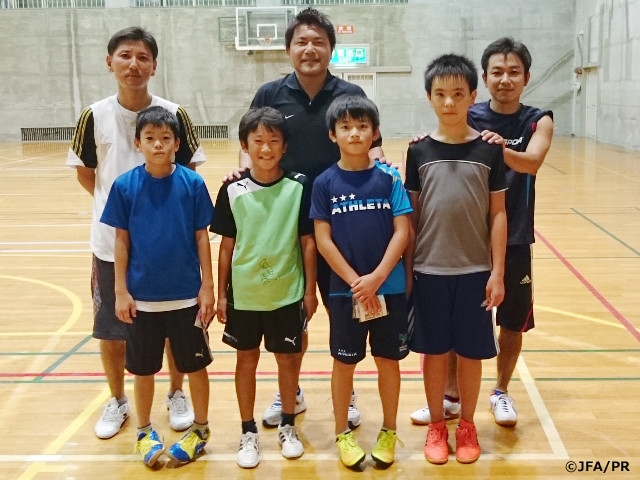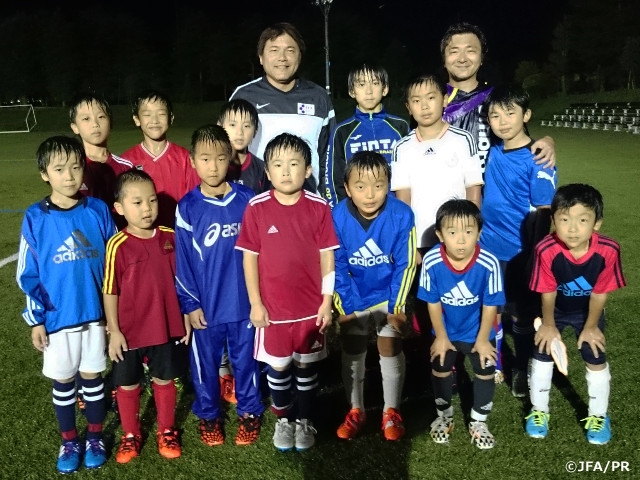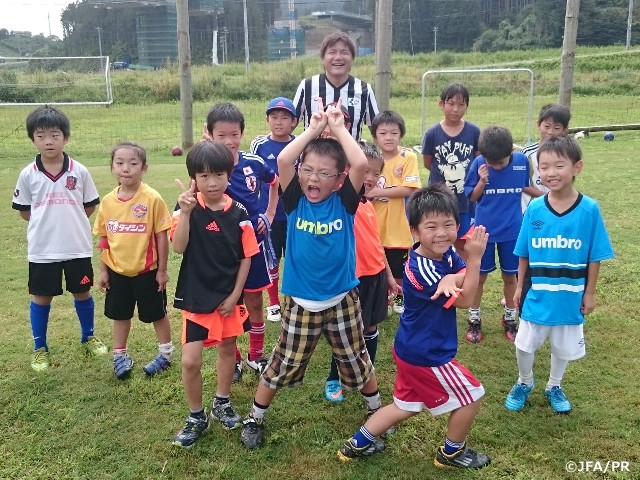NEWS
JFA Tohoku Reconstruction Support Project - September 2015 Report by TEGURAMORI Hiroshi, national training centre coach
14 October 2015

My September activities began at Yamamoto JFC's training in Yamamoto Town, Sennan District, and Miyagi Prefecture.
Yamamoto JFC have their practice in Yamamoto Town Sports and Culture Centre from 6:30 p.m. to 8 p.m. every Wednesday. As the use of footballs is prohibited at the practice site, the children had training with smaller balls. Although they practise at Yamamoto Daiichi Elementary School on weekends, the field does not have an enough size to take a boy's pitch, which forces the children to always play league matches on the road.
On that day, as six graders were standing on the verge of their school trip, only four participated in the training. The children team played a 4-on-3 game throughout the day against a team consisted of two coaches and myself. There are currently 16 players in the team, and seven of them are six graders. It is a concern what would happen after the six graders graduate. The team plan to recruit new members within this year to keep themselves alive.
In September, I centred on visiting the coast side of Iwate Prefecture. On 8th, I paid a visit to Greenpia Sanriku Miyako in Taro, Miyako to see FC Miyako Derufire Taro. Coach BABA from Iwaizumi Boys Sports Club also showed up at the site. As the sports club does not have so many players, they take part in competitions with FC Miyako Derufire.
Iwaizumi Boys Sports Club had two-hour training from 6 p.m. to 8 p.m., and Taro Daiichi Junior High School Football Club (former members of FC Miyako Derufire Taro) practised until 9 p.m. After 1-on-1, 2-on-2 and 3-on-3 training, they worked on a game-style 2S (server) and line-through 4-on-4 practice and a 5-on-5 + 4S (server) in the end.
Taro's junior high students can have only less than an hour for extracurricular sport activities due to their school bus schedule. The students who want to practise more come to the sports club. They worked hard with high motivation in the session that day as usual. Children in the devastated area cannot do what they want during their growing period and are always in this kind of situation. A lack of physical activities and a downturn of physical fitness are concerned. And like a lack of coaches, there are a lot of issues.
In Taro District and around Miyako Fishing Port, ground levelling and seawalls building have been under way, but they are being delayed as a whole. The same goes for the reconstruction public housing. The citizens' temporary housing life seems to be still far from over. According to FC Miyako Derufire Taro's coach YAMAMOTO Nobuyuki, the place for housing to be built on was finally determined and the foundation work is starting from now on.
On 9th, I went to see training of Hanawa Sports Soccer Club at the gym of Hanawa Elementary School in Miyako. After the disaster, I had some chances to see them at competition sites, but it was the first time to visit their training. The club have resumed their training at the gym on Wednesdays and Thursdays.
On the day, a total of 17 players got together to work on training, including club players from first graders to sixth graders, one child for a trial and two junior high school students of the ex-club members. They started with playing tag before working on passing and controlling drills and a 4-on-2 possession drill, and finished with a game in groups of each grade. The club's coach SAWADA Yutaka was also pleased he was able to play with the children because I came to join the practice. "That helped me get rid of stress," said the coach.
Hanawa Junior High School does not have a football club, and children who want to continue playing football need to go to Miyako Daini Junior High School or Kanan Junior High School. They need to ask their parents for a ride. Former members of the Soccer Club belong to a baseball club in their junior high school and said to me that they would play football again when getting into high school. I had complex feelings on the environment where they cannot play football even though they want to.
I was going to see FC Yamada Berueni's practice in Yamada Town on 10th, but it was suspended to the following week due to rain.
The ground levelling is being carried out around former Yamada Station and the city hall in Yamada as well, and the seawalls along the coastal road has a dominating presence. Now, there is a temporary shopping avenue, yet their moving to the levelled ground is still far from the execution. I made an impromptu visit to FC Ofunato Sanriku FC Seagull and joined their training session on that day.
Eight club members and two junior high students had a triangle passing drill, shooting training and a game for two hours from 5 p.m. at Ofunato municipal gymnasium. Since some of their coaches have their daily job to do, they sometimes cannot arrive on time or cannot make it to the whole session on other days. I was happy to have a chance to support them.
I visited activities in the coastal area of Iwate Prefecture on the following week as well. I joined FC Yamada Berueni's training on 15th. The children worked on a 1-on-1 and triangle passing drills before moving on to 4-on-2 and 5-on-2 workouts in front of goal at the civic sports park from 6 p.m. to 7:30 p.m. As they focused on the passing and controlling practice too much, they did it longer than planned. But they worked on those drills without fearing errors and I felt that it finished in a moment.

Starting from 6 p.m. on 18th, I coached 15 fifth and sixth graders from FC Kamaishi at Kamaishi City Kyugijo (artificial turf). The training began with a triangle passing drill and a 4-on-2 possession drill. After combination shooting practice workouts in a group of three, they went through offensive and defensive plays in front of goal (S+4-on-4+GK) and played a 7-on-6 with two goalkeepers (practicing both outnumbering and outnumbered situation) in the game at the end. They showed aggressive plays.
On 17th I visited the training of Otsuchi SC at the temporary joint field of an elementary school and a junior high school in the Terano area in Otsuchi Town. Once the rain starts falling, this field becomes unavailable for playing football. The local town office’s gym needs a reservation one month ahead of time, therefore there is nowhere for them to practice on a rainy day. The Prefectural Otsuchi Hospital is now under construction near the field in Terano, but it is four months behind the schedule.
Public housing has increased, but the future development plan is still unclear. One example is that there are not enough service companies for doing interiors of those housing. The ground where the temporary classroom building and the temporary field are will be eventually used for housing as well. And the completion of the new elementary-junior high joint school building is at this point scheduled to be in September next year, but they say it will be delayed also. Anyway, kids were enjoying football as always.
There will be an autumn festival in Otsuchi Town this weekend. People there love festivals so much that those who have left their hometown for school or work outside the prefecture often come back home for the autumn festival. An event like this should accelerate their recovery process.
After leaving the Otsuchi SC practice, I visited with Kamaishi Robin FC who were practicing in the rain at Kamaishi City Field. The reality is that teams based in the coastal areas have difficulty to make their way to Kamaishi in weekday evenings for practice.

Ofunato Sun Altus were scheduled to practise on 18th, but since the Tsunami alert due to an earthquake in Chile and also flooding and landslide warnings were on simultaneously, the practice was cancelled. It was good that the warning went off in the early evening. On 19th I helped a kids lesson by Takata FC at Rikuzen Takata Kamiosabe Ground. We had a very good practice from 9 to 10:30 with breaks between drills, engaging in ball feeling drills, dribbling, shooting and a mini-game. You can learn many things by watching energetic kids running around so unpredictably.
Then I visited Shinjinsen matches by the Junior High School Sports Federation in the south coastal area being held at the Takata Icchu temporary field. The little kids I got to know since I took this coaching position have turned junior high school students. When they found me on that day, they came and greeted me. Now they have grown so big and independent, which made me very happy.
The main field of Takata Icchu Junior High School still has temporary housing on it, and the temporary field is right next to their school building. The area is designated for the ground level raising project. So once the construction starts, they will lose their practice field. The conveyor belt installed in Rikuzen Takata City for the embankment heightening has been decided to be removed, and it is said the work will start in October.
The mountain which was 125m high has been cut down 80m and the land was used for the embankment. I suppose a new temporary field will be built at an appropriate place after the embankment work is finished. But possibly they lose the place to practice during that construction period.
I have visited practices of teams in the coastal region of Iwate Prefecture over the course of two weeks. Even today, four years and six months after the disaster, there are still those who live in temporary housing, who can’t move to public housing even though they want to, who, after moving to new housing, feel guilty toward those who are still in temporary housing, and who after moving, cannot feel at home in a new setting.
The ground level raising work and the coastal levee construction are apparently being undertaken, but the works such as road construction and land sectioning are not yet started. There are plans for building athletic fields, but the start of the construction is still uncertain. I acknowledge there are still a great deal of difficulty that people in the region have to face, but I sincerely hope the recovery will be done how those people want it to be done. “Keep moving forward, Iwate!”
To participate in "the FIFA Grassroots Course and Festival in JAPAN", I was in Wakura in Ishikawa Prefecture from 22 to 27 September. I learned many things there such as aiming for fun and quality, how to approach the core elements and how the coaching young generation is supposed to be. I appreciated every encounter with those course takers as well as I recognised my goal of holding the grassroots program in the disaster-hit region and making kids their smile. I would like the course takers in the current 2015 session to help me and join forces with me then! "Let’s work together!"
Related Information
Related News
-
JFA Tohoku Reconstruction Support Project - August 2015 Report by TEGURAMORI Hiroshi, national training centre coach

-
JFA Tohoku Reconstruction Support Project - July 2015 Report by TEGURAMORI Hiroshi, national training centre coach

-
JFA Tohoku Reconstruction Support Project - June 2015 Report by TEGURAMORI Hiroshi, national training centre coach

-
JFA Tohoku Reconstruction Support Project - May 2015 Report by TEGURAMORI Hiroshi, national training centre coach

-
JFA Tohoku Reconstruction Support Project - April 2015 Report by TEGURAMORI Hiroshi, national training centre coach

Latest News
-
National Teams
2026/02/19
U-20 Japan Women's National Team short-listed squad & schedule - Training Camp (2/23-26@JFA YUME Field)

-
National Teams
2026/02/19
Japan Beach Soccer National Team short-listed squad & schedule - Training Camp (2/26-3/2@Okinawa)

-
National Teams
2026/02/12
U-17 Japan National Team squad & schedule - Prayer for Peace; Hiroshima International Youth Soccer Games 2025 (2/17-23@Hiroshima)

-
National Teams
2026/02/12
Nadeshiko Japan (Japan Women's National Team) squad & schedule - AFC Women's Asian Cup™ Australia 2026 (2/23-3/22)

-
National Teams
2026/02/09
U-16 Japan Women's National Team short-listed squad & schedule - Training Camp (2/16-19@Okayama)



